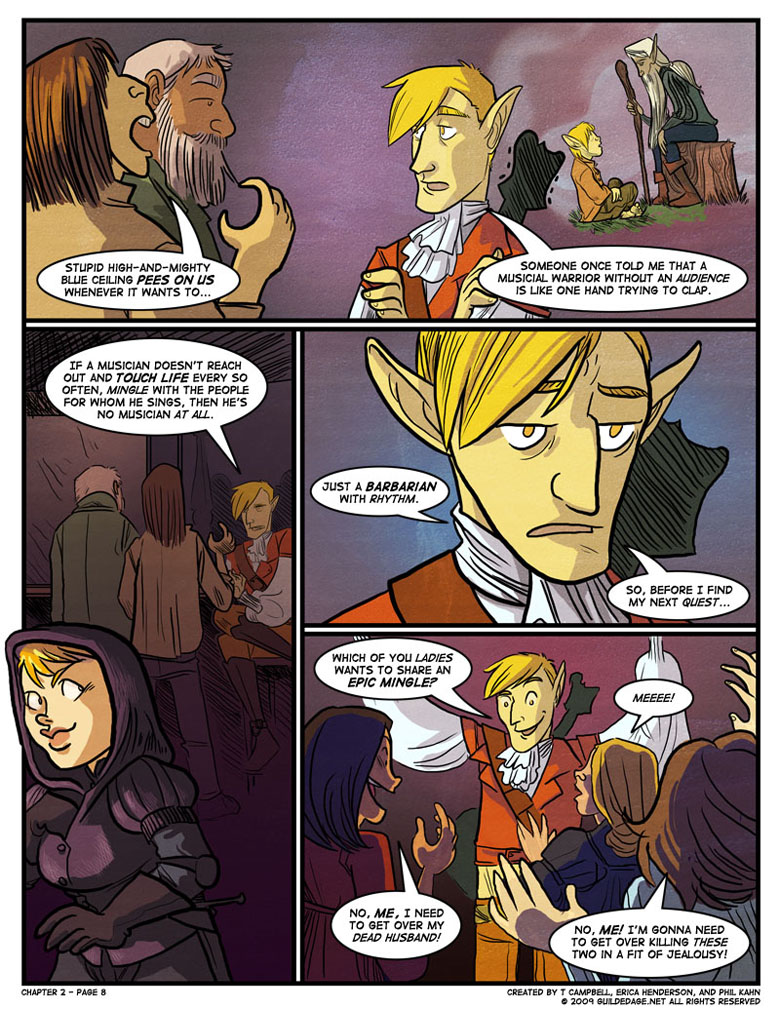Annotated 2-8
We never again referred to Best’s unnamed mentor seen in flashback here. Whoever he was, it is unlikely that he spent much time teaching Best, because that would imply he saw value in him, and that would conflict with Best’s history as given by prophecy and his personal account (“unappreciated in his youth,” “nobody’s told me I’m special before”). This makes Best’s own treatment of Tiny Tad– not excusable, but maybe a hair more understandable.
Erica’s breaking of panel borders, sometimes referred to as “breaking the fourth wall,” is appropriate as Bandit exits this portion of the narrative.
The name of the game with Best, in this scene and for a long time after, is “push and pull.” Ideally, he should show just enough redeeming value that you don’t quite want to dismiss him as an asshole through and through or as already a villain. For his somewhat respectable philosophizing here, I projected onto him a lot of concerns I was having as a creative person whose shyness could keep me from getting out and interacting with the people whom I tried to portray. I’ve always done a lot of my work by thinking my way into someone’s shoes from a distance, an approach with obvious pros and cons. His reversion to his douchey side, well, that came more naturally. I’m hoping that just means I was channeling the feelings I don’t often get to express, because the alternative is a little uncomfortable to face.











I honestly thought you guys just wanted to torpedo the heroic ‘chosen one’ trope.
Best does have allot of depth to him and I really do appreciate how this one page tells us why he is such a asshole without weighing down the tone or slowing down the pace of the story.
For me the narrative power of Best is that he’s someone most people want to hate but also have to respect. Most arrogant people in fiction also tend to be incompetent which not only makes them easy to hate but also makes that animosity feel justified or well founded at least.
Best is arrogant but also backs that arrogance up with genuine ability which pushes people out of their comfort zone. I think that’s why I’ve always liked him. He doesn’t just break the trope but does it an emotionally tangible way. This uncomfortable duality of Best culminates with him beating Byron in a fair fight.
We had some similar phenomena with Faith Abbott in Magick Chicks, a strip I edited. Although I admit it started to get frustrating when some vocal readers basically refused to believe Faith was hugely powerful and competent, despite a mountain of evidence in support of it. Maybe it was because Faith wandered into moral gray zones where even Best wouldn’t go, or maybe different community management styles just led different kinds of readers to speak up.
Though I’m half likely to try reading the comic to glean the answers for myself, this kind of speculation always leads me to ask questions, like “what biases did those readers have”, “did the character’s apparent value-blindness seem a likely obstacle, and therefore paradox, that implies she never could have developed the skills and insight demonstrated”, and “are there any reality-distorting elements to the narrative that might make it seem like those were borrowed or hallucinatory demonstrations?”
These questions seem like they deserve honest analysis, because the matter of audience perception seems a struggle for many creators even when they have good insights into their own audience already.
You’re probably better off verifying it yourself, but it sure seemed to me like Gisele, Dave, and I did everything possible to establish Faith’s power. No one in the text, from her bitterest enemies to her most devoted lapdogs, doubts it. She has frequent fights and, while occasionally frustrated in asymmetric battle, she only gets in trouble when she gives herself an enormous handicap or goes up against the power of a literal goddess. Moreover, in a school where combat abilities largely determine social status, she is easily the most popular student.
Now, I could understand why someone might want her taken down a peg sooner and more decisively than she was, just as I get that people wanted Best to be humiliated quickly and easily and then dumped down the narrative garbage chute. But, y’know… when the text is telling you that’s not going to happen easily, then it’s not going to change its mind on the next page.
I agree entirely with your opinion of the character. While I love Frigg and she brings the laughs left and right for me Best is still my favorite character in this saga. Shit, I won’t even put the effort to put into words why, you did a great job at it.
And he’s a goddamn Bard that kicks ass. Damn I love Bards!
Hey, I was enjoying re-reading the alt-texts! Now is only “Annotated 2-8”?
I join this man’s plight for justice. Alt Text is in this comic is half the joy for me.
Funny that in hindsight, “barbarian with rhythm” is a pretty apt description of Penk. (Which is not to say that he’s not *also* a real musician.)
Yes, but does it count as “redeeming value” if it’s only done in a deliberate attempt to offset and legitimize one’s ongoing douchebaggery? I think not, which means that Best has no redeeming value. He’s just a huge douche.